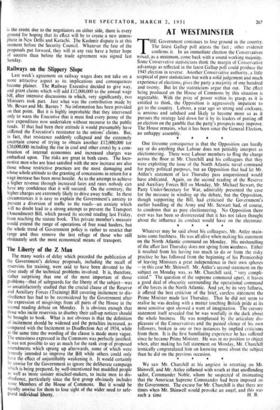A I WESTMINS TER
THE Government continues to lose ground in the country. The latest Gallup poll attests the fact ; other evidence confirms it. In an immediate election the Conservatives would, as a minimum, come back with a sound working majority. Some Conservative statisticians think the margin of Conservative advantage as reflected in the latest Gallup poll could produce the 1945 election in reverse. Another Conservative authority, a little sceptical of pure statisticians but with a solid judgement and much experience of elections, gives the party a majority of one hundred and twenty. But let the statisticians argue that out. The effect being produced on the House of Commons by this situation is regrettable. With the prize of power within its grasp, as it is entitled to think, the Opposition is aggressively impatient to get to the country. Labour, a year ago so strong and cocksure. is anxious and subdued and likely to become more so as it pursues the strategy laid down for it by its leaders of putting off an election on the gamble that the party's prospects may improve. The House remains, what it has been since the General Election, an unhappy assembly. * * * * One tiresome consequence is that the Opposition can hardly say or do anything that Labour does not pettishly interpret as electioneering. There were Labour members to fling the charge across the floor at Mr. Churchill and his colleagues that they were exploiting the issue of the North Atlantic naval command for party political purposes. but an Opposition that had let Mr. Attlee's statement of last Thursday pass unquestioned would have abdicated. Again, on the second reading of the Reserve and Auxiliary Forces Bill on Monday, Mr. Michael Stewart, the Party Under-Secretary for War, admirably presented the case for the measure in winding up the debate, but the Opposition. though supporting the Bill, had criticised the Government's earlier handling of the Army and Mr. Stewart had, of course. to condemn that as pure electioneering. No Opposition there ever was has been so disinterested that it has not taken thought about the influence its conduct would have on the electorate.
* a * * Whatever may be said about his colleagues, Mr. Attlee main- tains some freshness. He was all alive when making his statement on the North Atlantic command on Monday. His mishandling of the affair last Thursday does not spring from tiredness. Either it resulted from his having too much to do or from the risky practice he has followed from the beginning of his Premiership of leaving Ministers a great independence in their own spheres —in this case Mr. Shinwell. Mr. Attlee's second statement on the subject on Monday was, as Mr. Churchill said, " very compli- cated." The question of the supreme command apart, it leaves a good deal of obscurity surrounding the operational command of the forces in the North Atlantic. And yet, by its very fullness, it offered the best criticism of the brief, careless statement the Prime Minister made last Thursday. That he did not seem to realise he was dealing with a matter touching British pride at its most sensitive spot showed a want of imagination. The cursory statement itself revealed that he was woefully in the dark about the whole business. He was nonplussed by the articulate dis- pleasure of the Conservatives and the pained silence of his own followers, broken in one or two instances by implied criticisms from them. It is the first humiliating experience he has suffered since he became Prime Minister. He was in no position to object when, after making his full statement on Monday, Mr. Churchill ironically congratulated him on knowing more about the subject than he did on the previous occasion. * * * * We saw Mr. Churchill at his angriest in retorting on Mr. Shinwell. and Mr. Attlee inflamed with wrath at that unoffending sailor, Commander Noble. whom he suspected of insinuating that the American Supreme Commander had been imposed on the Government. The excuse for Mr. Churchill is that there are times when Mr. Shinwell would provoke an angel, and this was such a time H. B.


































 Previous page
Previous page